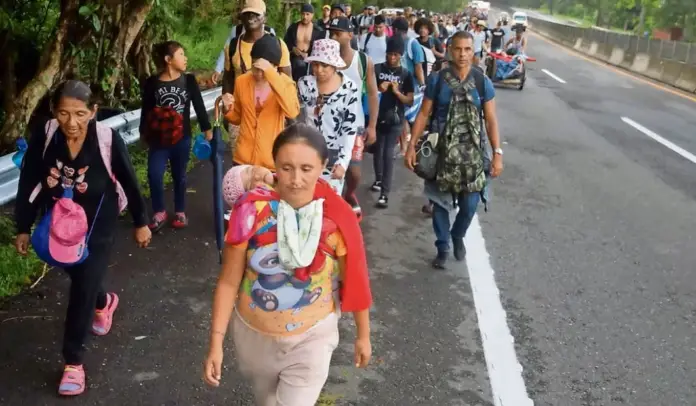The migrant caravan that left Tapachula, Chiapas, on October 1st bound for Mexico City is now reduced to half its size, halted in the municipality of Pijijiapan, and marked by fatigue, illness, and disillusionment. Among the hundreds of people still on the road, Cubans are among the most affected by the precarious conditions and the operations of the National Migration Institute (INM).
One of them is Adrián Rodríguez, 27, originally from Artemisa, who suffers from a serious screwworm infection in his right leg. Rodríguez asked Mexican President Claudia Sheinbaum for direct help to obtain a permit that will allow him to travel by public transport to the capital. “I am unable to continue walking,” he told the newspaper El Universal, after explaining that the wound forced him to stop and that, during the walk, he fainted from dehydration and infection.
The young Cuban, father of two children, ages six and one year and five months, left the island in search of work and stability. After two months in Tapachula, without receiving a response from the Mexican Commission for Refugee Assistance (COMAR), he joined the caravan hoping to obtain a document that would allow him to move toward the center of the country. Today, like many others, he finds himself stranded, sick, and without resources.
According to local press reports, the caravan—made up of migrants from Cuba, Haiti, Venezuela, Colombia, Brazil, Peru, Ecuador, and Central America—has been decimated: some were detained by the National Guard and the INM (National Institute of Migration), others voluntarily returned to Tapachula after accepting offers of temporary visas for humanitarian reasons, and several more abandoned the march due to exhaustion and illness.
The media outlet Conexión Migrante reported that more than 100 migrants, including Cubans, received one-year visitor visas, allowing them to legally reside in Mexico while they decide their future. One of the beneficiaries, identified as Carlos, also Cuban, explained that he surrendered to the authorities due to the seizures his wife suffered during the walk. However, only those who had already initiated procedures with COMAR were eligible for this benefit.
Meanwhile, those who remain in Pijijiapan maintain that they are not seeking confrontation, but simply a document that will allow them to advance “safely” to other cities. The National Human Rights Commission (CNDH) confirmed that it is monitoring the situation, following complaints of alleged abuse of authority during an operation by the INM (National Institute of Migration) and the National Guard in the early morning of October 9, according to El Universal.
The walkers have traveled only 148 kilometers in ten days, under heavy rains and extreme temperatures. Local authorities and humanitarian organizations are providing food, medical treatment, and sleeping accommodations, but the outlook remains uncertain.

Source: diariodecuba




